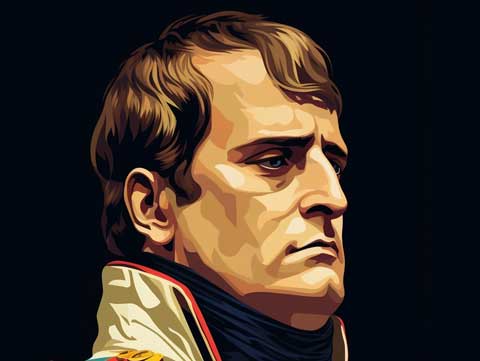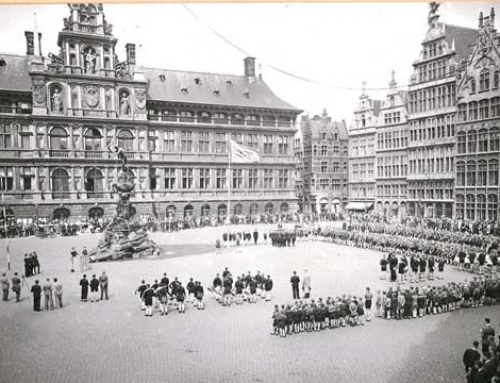After our recent dive into Ridley Scott’s film ‘Napoleon’, it’s time to explore the real man behind the myth. Today, we turn our attention to one of the most fascinating and influential figures in European history: Napoleon Bonaparte. This man was not only a military genius but also left an indelible mark on the legal and societal development in Europe. Let’s delve deeper into how this small man with big ambitions drastically changed the course of history.
The Napoleonic Code: a revolution in law
Napoleon Bonaparte’s influence is perhaps most visible in the Napoleonic Code, or the Civil Code. Revolutionary! For the first time, law was standardised, putting an end to a patchwork of local laws and customs.
This code laid the foundation for modern civil law in many European countries and even influenced legislation outside Europe. The idea that everyone is equal before the law and that freedom and property must be protected was groundbreaking. Of course, we must not forget that this ‘equality’ mainly applied to men – women and minorities still had a long way to go.
Freedom of expression: a double-edged sword
Napoleon Bonaparte, often seen as a child of the Enlightenment and the French Revolution, theoretically favoured the ideals of freedom, including freedom of expression. But in practice? Not so much. He used censorship and propaganda to consolidate his power. This is an important reminder that freedom of expression is a fragile good that must be protected and cherished.
Ministry of Police
In reality, Napoleon Bonaparte used censorship and propaganda as tools to consolidate and maintain his power. He controlled the press and limited the publication of critical opinions against his regime. A well-known example is the establishment of the ‘Ministry of Police’ in 1796, which, among other things, monitored the press and publications. This ministry had the power to shut down newspapers critical of the regime and played a crucial role in shaping the public image of Napoleon as an infallible leader.
(Source: “Napoleon and the Operational Art of War” by Michael V. Leggiere, discussing Napoleon’s control over the press and the creation of his public image.)
The temptation of authoritarian leadership
These practices of Napoleon are an important reminder of the fragility of freedom of expression. They show how easily this freedom can be undermined by authoritarian leaders, even by those who initially seemed to champion enlightened ideals. It’s a warning that freedom of expression should never be taken for granted but actively protected and cherished, especially in times when the temptation of authoritarian leadership lurks.
Napoleon’s approach to the press and freedom of expression shows that the struggle for true freedom and democracy requires ongoing effort, a lesson still relevant today.
Women’s rights: a step backward
Let’s face reality: for women’s rights, the Napoleonic Code was a significant step backward. Under this legislation, women were effectively treated as second-class citizens, with limited legal autonomy. This was a bitter pill, especially considering that women had actively fought for more rights and freedoms during the French Revolution.
The Napoleonic Code, introduced in 1804, imposed strict restrictions on women’s rights. For example, women had no right to own property or enter contracts independently. They were placed under the guardianship of their husbands or male family members, severely limiting their legal and personal freedom. This legislation confirmed male dominance in family life and society and undermined the progress women had made during the French Revolution.
Source: “Women and the Limits of Citizenship in the French Revolution” by Olwen Hufton, discussing the impact of the Napoleonic Code on women’s rights and their position in French society.
The long road to equality: the Napoleonic Code and women’s rights
Indeed, it would take many decades before women in Europe could reap the fruits of legal equality. The Napoleonic Code set a standard that was adopted in many European countries, making the struggle for women’s rights a long and arduous process. This period reminds us that acquired rights should never be taken for granted and that the fight for equality and justice requires ongoing effort.
The impact of the Napoleonic Code on women’s rights is a clear example of how legislation can influence the social position of an entire group of people and highlights the importance of constant vigilance and struggle for equal rights for everyone.
Napoleon’s legacy: a mixed picture
Napoleon Bonaparte was undoubtedly a complex figure. On one hand, he brought stability and modernization to the chaotic world after the French Revolution. On the other hand, his reign was authoritarian and often oppressive. His legacy in terms of human rights and freedoms is therefore mixed.
At its core, Napoleon shows us how one person can change the course of history, for better or worse. His influence on the legal landscape in Europe is undeniable, but his impact on human rights and freedoms is a reminder that there is always room for improvement and that the struggle for equality and freedom is never truly over.
So, what do you think? Was Napoleon a hero or a tyrant? Or maybe something in between? One thing is certain: his legacy continues to fascinate and challenge us today.






